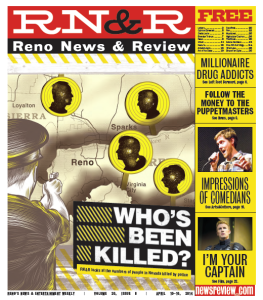In journalism, as with other professions, using somebody else’s work and claiming it as your own is a serious ethical violation. We call it plagiarism. People get fired for it.
There is also a longstanding practice of using somebody else’s idea and making it your own. Often, you simply give credit where credit is due. Just as often, though, it gets adapted and nobody pays much attention to who came up with the original idea.
However, when you win a Pulitzer Prize for using somebody else’s idea, and fail to give credit to the originator, I think you should give the Pulitzer Prize back — with an explanation and apology.
That’s the situation with the Fatal Encounters project built by the Reno News & Review and its former editor, Brian Burghart, who started gathering data on police killings two years before the Washington Post.
The Post won a Pulitzer last month for its stories on police killings. I have no doubt there was great reporting in the series, although I’ve read very little of it.
But the Pulitzer board specifically cited the “revelatory initiative in creating and using a national database” in its project. The Post made that claim in its submission, and it’s only contributed to the misleading notion with its reporting.
Burghart does an excellent job of explaining the circumstances of how the Post came to learn of Fatal Encounters and how, in nominating itself for the Pulitzer, it never mentioned that the database idea came from an alternative weekly newspaper editor in Reno who had started down that road in 2012. In fact, it kind of goes out of its way to claim that nobody else was doing it.
Some people think Brian is whining about the Post, its coverage of the Pulitzer prize and the lack of attribution to Fatal Encounters.
I don’t.

In fact, I think he’s being fairly gracious in insisting that what’s really important is the accountability of police through these databases.
Let’s be honest here. The Nevada Press Association awarded Burghart, the News & Review and its series on Fatal Encounters the “Story of the Year” in 2015 for the work it had done on exactly what the Washington Post claimed a year later was “unprecedented.”
No, the Post’s work wasn’t plagiarism. It did a great deal to expand on the Fatal Encounters project and reporting. It may well, indeed, be Pulitzer-worthy.
But I can’t stomach the myth it has now created for itself of breaking new ground that, instead, had been plowed by Fatal Encounters.
Even if the Post keeps its Pulitzer, it still owes Burghart and the Reno News & Review an apology.
 Nevada Press Association The best in Nevada journalism since 1924
Nevada Press Association The best in Nevada journalism since 1924
